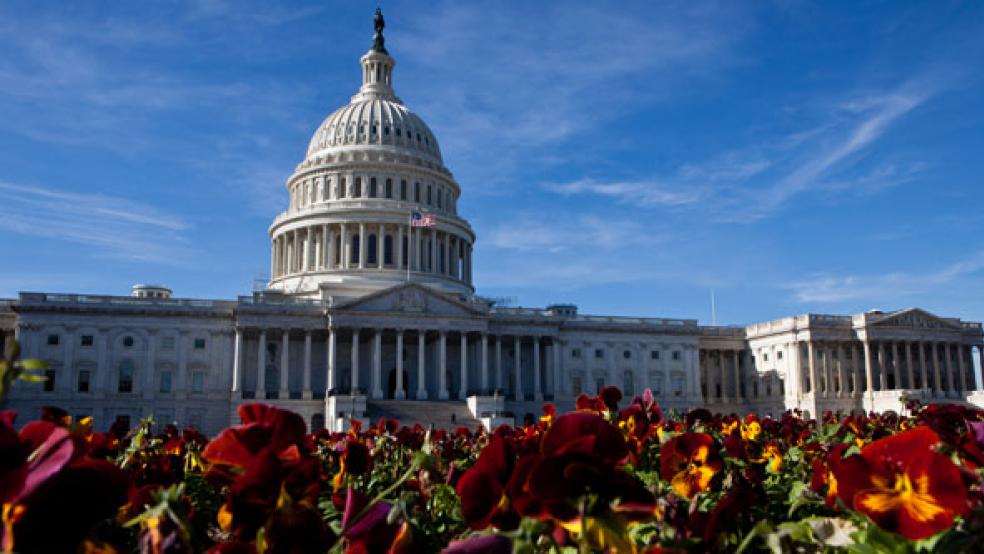The idea of Donald Trump atop the Republican ticket in November has Democrats wondering if they could soon return to early days of the Obama administration, when the party enjoyed healthy majorities in both chambers of Congress.
The GOP was already expecting to defend vulnerable Senate seats, -- 24 of 34 Republican seats are up for grabs this Election Day. There is also growing concern among establishment Republicans that their wide majority in the House could be endangered if Trump – whose controversial statements have alienated many female and minority voters and could prompt loyal poll-goers to stay home – is the 2016 nominee.
Related: The Five Most Endangered Senate Republicans
While retaking the lower chamber is an aspirational goal, for the time being, Democrats feel they can win more Senate seats beyond the five they need by tying Trump to Republicans running this fall. The Democratic Senatorial Campaign Committee DSCC recently unveiled a “Party of Trump” advertising effort to drive the point home.
The DSCC raised $6.2 million in February, compared to nearly $4.8 million for the National Republican Senatorial Committee (NRSC). The NRSC has a cash advantage, though, with $16.2 million on hand versus the DSCC’s $15.2 million.
Here are the Senate seats that could be snatched by Democrats:
Arizona. Polls show Senate Armed Services Committee chair John McCain in a statistical dead-heat against Rep. Ann Kirkpatrick. Not surprisingly, the five-term incumbent enjoys an enormous cash advantage over his challengers, about $5.1 million to less than $1 million.
Related: Trump vs. Cruz Is Turning Into a Bare-Knuckled Bar Fight
Last month Kirkpatrick releasing a web ad contrasting some of Trump’s more incendiary statements with vows by McCain to support the eventual GOP nominee, even the billionaire.
Last week Trump won the state’s presidential primary handily, beating his closest challenger, Ted Cruz, 47 to 24 percent.
Pennsylvania. Sen. Pat Toomey could easily be put on the list of the five most endangered Republicans running this fall, but he’s managed to stay below the radar as the Democrats sort out a messy primary to select his challenger.
The DSCC is eager to shore up the Keystone State and last week endorsed former gubernatorial chief of staff Katie McGinty over Navy admiral and former Rep. Joe Sestak, even though McGinty trails in polls and hasn’t raised as much money.
Related: Trump Might Win the Nomination, but Cruz Won the GOP
A RealClearPolitics average of polls shows Toomey with a healthy lead over Sestak. But he isn’t taking anything for granted, and recently indicated he would be willing to meet with President Obama’s Supreme Court nominee, bucking GOP leadership.
North Carolina. At first glance, one could ensure this Southern Senate seat; however, Obama carried the state in 2008 and lost it by a hair in 2012. Plus, the state’s Democrats have rallied around former state Rep. Deborah Ross after she cruised to victory in the recent primary.
A survey by the left-leaning Public Policy Polling survey released last week found Senate Intelligence Committee chair Richard Burr with just a five-point lead over Ross and suggested that lead could shrink with Trump atop the ticket.
Missouri. Democratic Senate candidate Missouri Secretary of State Jason Kander has an uphill fight to take down Sen. Roy Blunt in a state that has gone in the GOP column the last two presidential elections.
Kander, who served as an Army intelligence officer at U.S. Central Command’s Intelligence Division before volunteering to go to Afghanistan in 2006, hopes to make national security a core issue of the campaign. He has chastised Blunt, the Senate GOP’s conference vice chair who sits on the Appropriations Committee, for playing politics with funds for the Homeland Security Department and the anti-ISIS fight.
Related: Why Clinton Can’t Afford to Take Her Eyes Off Bernie Sanders
A 2015 Public Policy Polling survey last August showed Blunt ahead of Kander by 5 points.
Iowa. If there’s a race where Kirkpatrick’s early tactics could be copied, it’s the Hawkeye State.
Former Iowa Lt. Gov. and Secretary of Agriculture Patty Judge entered the race earlier this month, in large part because Senate Judiciary Committee chair Chuck Grassley refused to meet, let alone hold hearings on Obama’s Supreme Court pick – Merrick Garland.
During a presidential debate last month, Trump said the GOP-controlled Senate should block any potential nominee. "I think it's up to [Senate Majority Leader] Mitch McConnell and everybody else to stop it — it's called delay, delay, delay," the White House hopeful said in remarks that could easily be translated into ads.
A new CNN/ORC poll found two-thirds of Americans want the Senate to hold confirmation hearings on his candidacy, and a majority of Americans say the Senate should ultimately vote to confirm Garland.
That tracks with a Quinnipiac University poll released Thursday found registered voters said the Senate should consider Garland's nomination by a 2-to-1 margin.
Patty Judge visited Capitol Hill earlier this month to huddle with Senate Democrats who plan to keep hammering Grassley for his stance. Public opinion and pressure from Democrats could be working, since Grassley seems to be more open to Garland’s appointment.
"The thing she said that was really very, very powerful is that she's one judge that Sen. Grassley can't ignore," Senate Minority Leader Harry Reid (NV) told reporters.





